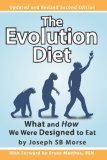- June 25, 2008
- Posted by: thestateofart
- Categories: Cosmos, Literature
By JSB Morse, author of The Evolution Diet
 Ever since certain fad diets became popular in the seventies and eighties, the general conception of a ‘diet’ is viewed as a quick and easy tool to help its participants lose a few pounds, without any regard to lifelong eating habits. In other words, it is seen as a short-term fix. What ends up happening with people on these short-term plans is that they tend to go back to eating poorly after the weight goal has been met or worse, when the weight goal hasn’t been met and seems impossible to achieve. In fact, researchers at UCLA have recently revealed shocking findings: dieting just doesn’t work. The school reviewed 31 long-term studies on dieting and found that people who go on diets usually end up regaining all of the weight they lost, plus some after they stop dieting. In addition to the weight gain, researchers say that the ups and downs of dieting cause added stress and contribute to heart disease. The study seems bleak for those looking to shed pounds, but, still, people continue the quick-fix methods, moving to the next one as soon as they give up on the previous one, usually to no avail.
Ever since certain fad diets became popular in the seventies and eighties, the general conception of a ‘diet’ is viewed as a quick and easy tool to help its participants lose a few pounds, without any regard to lifelong eating habits. In other words, it is seen as a short-term fix. What ends up happening with people on these short-term plans is that they tend to go back to eating poorly after the weight goal has been met or worse, when the weight goal hasn’t been met and seems impossible to achieve. In fact, researchers at UCLA have recently revealed shocking findings: dieting just doesn’t work. The school reviewed 31 long-term studies on dieting and found that people who go on diets usually end up regaining all of the weight they lost, plus some after they stop dieting. In addition to the weight gain, researchers say that the ups and downs of dieting cause added stress and contribute to heart disease. The study seems bleak for those looking to shed pounds, but, still, people continue the quick-fix methods, moving to the next one as soon as they give up on the previous one, usually to no avail.
 This yo-yo dieting confuses the body and frustrates the psyche, and never quite lives up to the sensational claims that these diet gimmicks advertise. Testimonials similar to, “I lost 50 pounds in 5 weeks!â€, and “I dropped 15 pounds the first week!†lead to inaccurate interpretations of what a diet should be. If these people were to continue on their so-called diet, they would be weightless within a couple years. Now that would be amazing!
This yo-yo dieting confuses the body and frustrates the psyche, and never quite lives up to the sensational claims that these diet gimmicks advertise. Testimonials similar to, “I lost 50 pounds in 5 weeks!â€, and “I dropped 15 pounds the first week!†lead to inaccurate interpretations of what a diet should be. If these people were to continue on their so-called diet, they would be weightless within a couple years. Now that would be amazing!
The truth is that these diets, which temporarily allow rapid weight loss, are often times just dehydrating the body. The weight lost on these diets is primarily in H2O not LBS, and since the body is about 60% water, it is fairly easy to drop a few pounds of it. Inevitably, though, the ‘contestants’ on these ‘miracle diets’ must change their habits back or at least alter them so as not to eliminate themselves from existence altogether.
These whacky eating habits are missing the point completely and they are leading to a misnomer, a diet, by definition, is not some two-week panacea to help you lose weight; it is much broader than just that. A diet is someone’s general intake of food. People still have a diet even when they’re not on a diet. A diet also is something that takes place over one’s entire life, not just the five weeks before one’s wedding day or class reunion. When looked at in this light, people who go on those gimmicky diets advertised on late-night television aren’t on a high-protein diet, or a lettuce-only plan; these people are on an extremely unhealthy yo-yo diet.
Changing one’s eating habits so drastically so often is bad for one’s health, something that most diet promoters fail to explain. Interestingly, an obese person has a better chance of living longer than someone who fluctuates habitually between being obese and having an ideal weight. A University of Michigan study conducted by cardiologist Claire Duvernoy, M.D. has found that a direct link between the gain-loss-gain syndrome of yo-yo dieting and cardiovascular disease in women. It turns out that such an oscillation of weight adds a great deal more stress than a constant weight. But Natural Man went through long droughts without food—doesn’t that mean that we are designed to withstand ups and downs in our diet like our ancestors? While we do have a remarkable capability to adapt to our environment (described further in Part Two), up-and-down dieting is still considerably harmful. In addition, during a drought, Natural Man’s body mass index (BMI) shifted from ideal to underweight and back—a completely different physiological story than a BMI that shifts from obese to overweight and back.
That isn’t to say that one shouldn’t try to lose weight if they’re a little tight in the waistline. The constantly obese person has a drastically smaller chance of living longer than someone at a constant ideal weight. A Dutch study published in the Annals of Internal Medicine (2003) says that obese women live an average of 7.1 fewer years than women of normal weight. Obese men live 5.8 fewer years on average than their healthy counterparts. That’s almost 10% of the average lifespan!
The solution for everyone is to learn a method of eating that brings everyone to his or her ideal weight and keeps them there without the need to yo-yo diet. The typical counter to that statement would be, “Well, everyone is different. There can’t possibly be a diet that works for everyone.†But there is. It just so happens that at one point, all humans did eat the same diet: the natural hunter/gatherer diet, and they were remarkably healthier than we are today despite lack of medicine and wealth as we’ll see later. The Evolution Diet emulates this healthy hunter/gatherer diet and supports a robust lifestyle for everyone, regardless of personality or physical makeup. Because this method of eating is strictly linked to the natural methods of the body, it will work to create a stable, healthy weight for everyone who adheres to the guidelines. One of the most vital attributes of The Evolution Diet is that it is even beneficial for people who are already at their ideal weights, thus someone can maintain just one diet for their entire life, the healthy way it should be.
Read more on The Evolution Diet!

